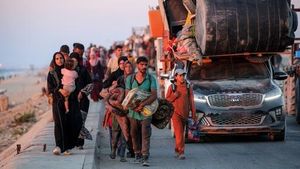Australia Day, observed on January 26, 2025, has become synonymous with division and debate across the nation. While many Australians celebrate their national identity, Aboriginal and Torres Strait Islander communities regard this date as 'Invasion Day'—a day denoting grief and remembrance for the impact of colonization. This dichotomy was clearly on display as communities gathered to either welcome new citizens or protest against the day of celebration.
More than 60 new Australian citizens from 32 different countries were welcomed this year at the City of Perth’s Australia Day Citizenship and Awards ceremony. Lord Mayor Basil Zempilas conveyed his pride, stating, “It was a privilege to see such a diverse range of people becoming Australian citizens here.” Esteemed guests included Mayor Menna from Vasto, Perth’s sister city, who joined the celebrations appreciating the multicultural fabric of the community.
The awards ceremony also honored four remarkable individuals for their contributions to community resilience. Joe Tuazama was named Citizen of the Year for his dedication to the African community after fleeing Liberia. Youth Citizen of the Year recognition went to Zoe Cornelius, who has tirelessly advocated for survivors of domestic violence. Meanwhile, Sandra Cornell received the Senior Community Citizen of the Year award for her volunteer work supporting homeless individuals, and the active citizenship award went to the Read Write Now program, which offers free tutoring for adults.
While festive activities unfolded, protestors across Australia gathered for the annual 'Survival Day' and 'Change the Date' rallies, highlighting the underlying tensions surrounding January 26. Thousands of people participated, expressing solidarity with Indigenous communities facing historical injustices.
For years now, rallies have gained momentum, with Brisbane witnessing around 5,000 attendees, as they united to call for change. Activists emphasized the importance of remembering the nation’s complex past, with participant Zaida stating, “This day has been really growing with more people coming out and saying they want to see a change.” From the standpoints of many Indigenous Australians, this date signifies the beginning of displacement, violence, and loss of their cultures.
Indigenous leaders rallied participants at Melbourne’s Parliament House, where commemorative events fused mourning and resilience. Organizer Caroline Kell described the event as, “a gathering to rise and resist,” emphasizing the dual nature of the day—it is both sorrowful and celebratory as Aboriginal people assert their existence and rights.
Across various states, different ceremonies also took place, with the Wadawurrung Traditional Owners Corporation organizing truth-telling events to embrace First Nations culture and reflect on colonization’s consequences. Similarly, community gatherings were seen from Sydney to Hobart, where ceremonies aimed at fostering community ties and amplifying Indigenous voices were held with vigor.
While celebrations took place along Sydney Harbour, thousands enjoyed the sun with attractions and activities typical of Australia Day. Yet, the celebrations were juxtaposed against rallies where speakers condemned social injustices, particularly the high rates of Indigenous deaths in custody. Organizer Paul Silva reiterated the need for collective unity against the systemic discrimination faced by Indigenous Australians, urging attendees to “come together and unite.”
Not everyone viewed the day with the same enthusiasm, particularly with rising calls to abolish or rethink Australia Day. According to Mary-Anne of Humanists Australia, “We need a day where we can celebrate our beautiful country and all of its diverse peoples, a day where joy is felt, and not today.” This sentiment echoed across rallies conducted from Darwin to Adelaide, emphasizing widespread discontent with the current date of celebration and advocating for systematic change.
Attendees across both sides echoed the importance of acknowledgment and reconciliation. Many non-Indigenous Australians joined the protests, marking their support for the movement’s call to action. A young attendee shared their thoughts: “I'm just out here to support Indigenous Australians. It’s not a day to celebrate.” This growing awareness among allies signifies a shift toward recognizing the historical grievances stemming from colonization.
The tension was palpable at various event sites where protestors and celebrants occasionally crossed paths, leading to police intervention to maintain separation. Yet, there remained opportunities for dialogue, as both sides expressed their views on what it means to be Australian today.
From lively celebrations to passionate protests, January 26, 2025, encapsulates the complex identity of Australia—a country rich with diverse cultures and contrasting historical narratives. This year, as communities continue advocating for change, the push for recognition and reconciliation shows no signs of waning, reaffirming the importance of listening, learning, and moving forward together.



